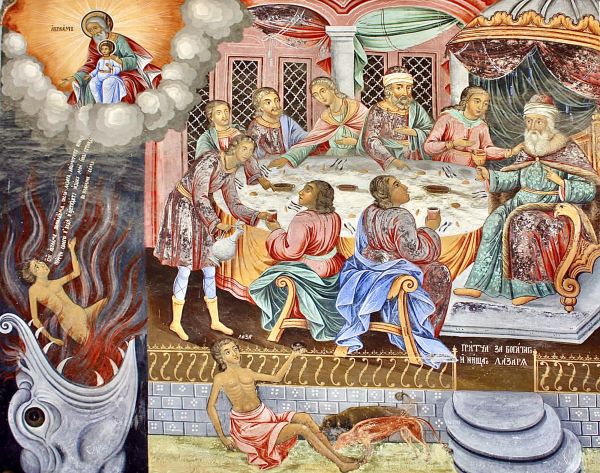Today's Gospel reading presents us with three important existential dimensions that Francis held in high regard.
The parable of poor Lazarus and the immoderate rich man evokes the diligent use of riches, concern for the needy, and is a call to conversion, since after death, individual judgement will be irreversible.
Francis, the Poor Man of Assisi, always had this Gospel image before his eyes, which led him to turn his heart more fully towards God and the poor.
The Sources attest that, from the beginning of his journey:
"(Francis) had always helped the needy, but from that moment on he firmly resolved never to refuse alms to the poor who asked for them for the love of God, and indeed to give spontaneously and generously.
Whenever Francis was away from home, he would give money to any poor person who asked him for charity; if he had none, he would give them his hat or belt, so as not to send them away empty-handed.
Or, if he had neither, he would withdraw to a secluded place, take off his shirt and secretly give it to the poor man, begging him to take it for the love of God.
He bought tools that churches needed and secretly gave them to poor priests" (FF 1403).
Furthermore, the Legend of the Three Companions informs us:
"Divine grace had profoundly changed him. Although he did not wear a religious habit, he longed to find himself unknown in some city, where he could exchange his clothes for the rags of a beggar and try begging himself for the love of God" (FF 1405).
The Minim knew that what he gave to the poor was given to Christ himself and that a single glass of water given to those little ones and marginalised people was offered to Jesus.
The encounter with the leper in the plain of Assisi had, in fact, transformed bitterness into true sweetness in him.
Francis feared divine judgement and desired to respond to what the Word of God asked of him.
He was truly the Poor Man made bread, the Jester made mercy, the Generous One who regenerates hope.
Assisi had become for him the table of Charity on which to place love and forgiveness; a welcome for the unconsidered - an unknown number for the rich gluttons of the time, cleared through customs by his evangelical life.
We read in the Sources:
"[the friars] despised [...] all ephemeral goods, coveted by the lovers of this world.
Above all, they opposed money, trampling it like the dust of the road.
Francis had taught them that money was worth no more than donkey dung.
The more they were separated from the world, the more they clung to God.
They advanced along the way of the cross and the paths of justice: they removed every obstacle from the narrow path of penance and evangelical observance, in order to leave a smooth and safe road for those who would follow them" (FF 1454).
Chiara herself, from an early age, deprived her body of food to give it to the poor, maintaining this attitude of care and special concern for the needy throughout her life.
Both made intelligent, evangelical use of the goods at their disposal in the service of the Kingdom of God.
«Son, remember that you received your good things in your lifetime, and Lazarus likewise received evil things; but now he is comforted here, and you are tortured» (Lk 16:25)
The little Poor Man always exhorted his friars to be merciful to every form of poverty, because judgement does not grant full life to those who do not recognise it in their brothers.
«Now there was a rich man who was clothed in purple and fine linen and who feasted sumptuously every day. But a poor man named Lazarus lay at his gate, covered with sores and longing to be fed with what fell from the rich man's table» (Lk 16:19-20)
Sunday 26th in O.T. year C (Lk 16:19-31)












